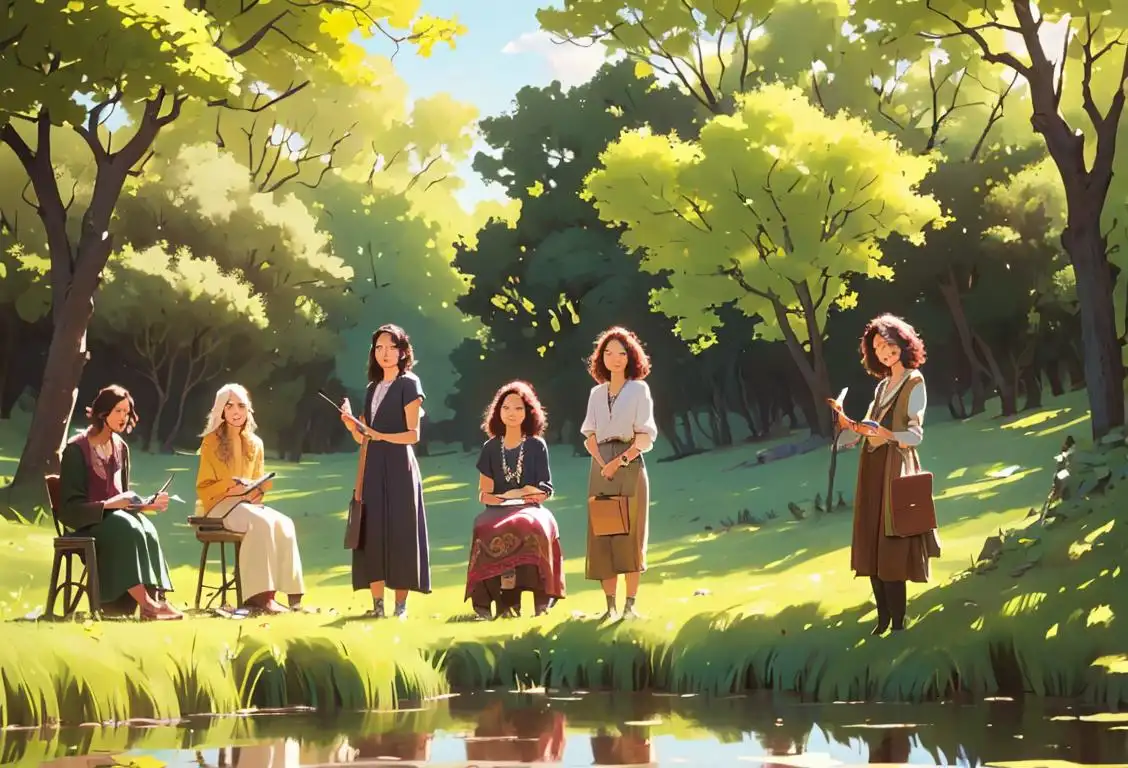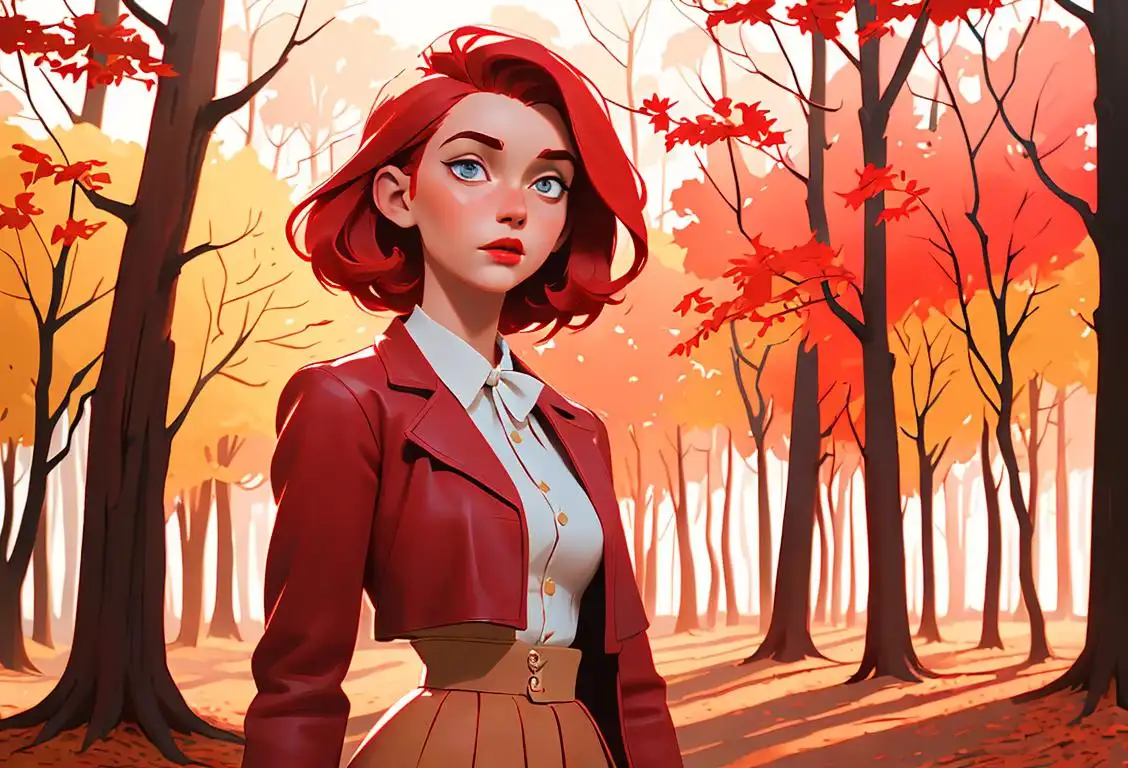National Poets Day

Welcome to National Poets Day, a day for celebrating the incredible power of words and the talented individuals who wield them like weapons of mass inspiration! Whether you're a fan of Shakespearean sonnets, modern-day rap battles, or even the occasional cheesy pickup line, today is all about honoring the poets who have graced us with their lyrical genius. Get ready to dive into the fascinating world of poetry and unleash your inner wordsmith!
When is Poets Day?
It's national poets day on the 8th October.
The Origins of National Poets Day
While the exact origin of National Poets Day is as elusive as a perfect rhyme scheme, it is believed to have sprung from the hearts and minds of literature enthusiasts who were tired of their favorite art form being overshadowed by Hollywood blockbusters and viral cat videos.
The first documented celebration of National Poets Day took place on October 8, 2015. Social media erupted with messages of appreciation for poets from all walks of life. People were sharing their favorite verses, attending poetry slams, and even engaging in impromptu Shakespearean monologues on street corners. The event captured the attention of both budding poets and seasoned wordsmiths, confirming that there was indeed a deep-rooted love for poetry within the cyber realm.
A Day to Celebrate Poetry
Every year on National Poets Day, people gather in virtual and physical spaces to pay homage to the beauty and power of poetic expression. Whether it's through attending poetry readings, participating in workshops, or simply indulging in some alone time with a book of poems, there's no shortage of ways to celebrate this special day.
One popular tradition on National Poets Day is the exchange of handwritten poems. It's a thoughtful gesture that allows people to express their admiration for a poet or share their own heartfelt verses. This tradition harks back to a time before the internet, when text messages and emojis weren't even a speck on the horizon. So, why not dust off your fountain pen and surprise a loved one with a heartfelt poem? Trust us, it's the kind of romantic gesture that will earn you major swoon points!
Another way to celebrate National Poets Day is by exploring different styles and forms of poetry. From haikus to limericks, from free verse to sonnets - there's a poetic style for every mood and occasion. Take this opportunity to experiment with different forms, and who knows, you might just discover a hidden talent for rhyming that you never knew you had!
Did You Know?
Did you know that the longest poem ever recorded in history is the Mahabharata, an ancient Indian epic that is approximately 1.8 million words in length? Talk about a poetry marathon! It would take you ages to read it aloud in one sitting, so we wouldn't recommend it for your next bedtime story.
History behind the term 'Poets'
7th century BC
The Ancient Greek Beginnings
The term 'poets' finds its origins in ancient Greece around the 7th century BC. In Greek, the term 'poetēs' referred to a creator or maker. However, during this time, the term was not limited to individuals who wrote poetry but also included musicians, storytellers, and performers. These individuals were highly respected in Greek society and often played a significant role in religious and cultural events.
9th century AD
The Troubadours and Minnesingers
In Europe during the 9th century AD, a new wave of poets emerged known as the troubadours and minnesingers. The troubadours, originating in the Occitan region of medieval France, composed and performed lyric poetry in the courtly love tradition. Similarly, the minnesingers, hailing from Germany, specialized in love poetry and sang their works accompanied by instruments. These new forms of poetry and storytelling contributed to the development of the term 'poets' as we understand it today.
14th century
The Influence of Dante and Petrarch
During the 14th century, the works of Italian poets Dante Alighieri and Francesco Petrarch had a profound impact on the term 'poets.' Dante's 'Divine Comedy' and Petrarch's collection of sonnets elevated poetry to new heights, demonstrating its power as a form of artistic expression. Their writings popularized the term 'poets' and solidified its association with writers of verse and creative literature.
17th century
The Elizabethan Era and Shakespeare's Legacy
The 17th century marked a significant period for 'poets' due to the flourishing literature of the Elizabethan Era in England. The playwright and poet William Shakespeare, considered one of the greatest poets of all time, crafted numerous works that continue to be celebrated today. Shakespeare's immense popularity and his use of poetic language helped shape the public perception of 'poets' as skilled wordsmiths and creators of verse.
19th century
Romanticism and the Poet as a Romantic Figure
The 19th century witnessed the rise of Romanticism, an artistic and intellectual movement that placed emphasis on emotions, individuality, and nature. During this period, poets such as William Wordsworth, Samuel Taylor Coleridge, and Lord Byron became icons of the Romantic movement. They portrayed the poet as a figure who experiences intense emotions, seeks sublime beauty, and possesses a profound connection with the natural world. This image of the poet as a romantic figure has since remained deeply ingrained in popular culture.
20th century
Poetry Movements and Modern Voices
The 20th century witnessed a plethora of poetry movements that further expanded the definition of 'poets' and their impact on society. From the imagist movement led by poets like Ezra Pound and T.S. Eliot to the beat generation of Allen Ginsberg and the confessional poets like Sylvia Plath, each movement brought forth distinctive voices and styles. These diverse expressions of poetry influenced various cultural aspects and contributed to the evolving understanding of what it means to be a poet.
Did you know?
Did you know that the longest poem ever recorded is approximately 1.8 million words long? Talk about an epic!Tagged
romance fun loved onesFirst identified
8th October 2015Most mentioned on
8th October 2015Total mentions
70Other days
Love Your Red Hair Day
Do Something Nice Day
Suicide Prevention Month Day
Kissing Fried Chicken Day
Kiss A Ginger Day
Iloveyou Day
Compliment Day
Happiness Day
Tv On The Same Day
Boyf Day









